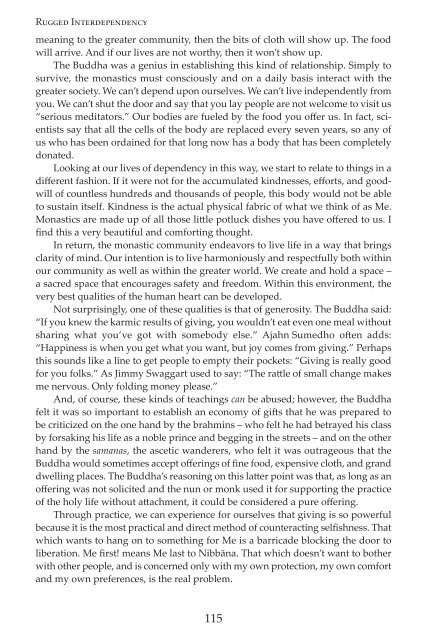Rugged Interdependency - Amaravati Buddhist Monastery
Rugged Interdependency - Amaravati Buddhist Monastery
Rugged Interdependency - Amaravati Buddhist Monastery
- No tags were found...
You also want an ePaper? Increase the reach of your titles
YUMPU automatically turns print PDFs into web optimized ePapers that Google loves.
<strong>Rugged</strong> <strong>Interdependency</strong>meaning to the greater community, then the bits of cloth will show up. The foodwill arrive. And if our lives are not worthy, then it won’t show up.The Buddha was a genius in establishing this kind of relationship. Simply tosurvive, the monastics must consciously and on a daily basis interact with thegreater society. We can’t depend upon ourselves. We can’t live independently fromyou. We can’t shut the door and say that you lay people are not welcome to visit us“serious meditators.” Our bodies are fueled by the food you offer us. In fact, scientistssay that all the cells of the body are replaced every seven years, so any ofus who has been ordained for that long now has a body that has been completelydonated.Looking at our lives of dependency in this way, we start to relate to things in adifferent fashion. If it were not for the accumulated kindnesses, efforts, and goodwillof countless hundreds and thousands of people, this body would not be ableto sustain itself. Kindness is the actual physical fabric of what we think of as Me.Monastics are made up of all those little potluck dishes you have offered to us. Ifind this a very beautiful and comforting thought.In return, the monastic community endeavors to live life in a way that bringsclarity of mind. Our intention is to live harmoniously and respectfully both withinour community as well as within the greater world. We create and hold a space –a sacred space that encourages safety and freedom. Within this environment, thevery best qualities of the human heart can be developed.Not surprisingly, one of these qualities is that of generosity. The Buddha said:“If you knew the karmic results of giving, you wouldn’t eat even one meal withoutsharing what you’ve got with somebody else.” Ajahn Sumedho often adds:“Happiness is when you get what you want, but joy comes from giving.” Perhapsthis sounds like a line to get people to empty their pockets: “Giving is really goodfor you folks.” As Jimmy Swaggart used to say: “The rattle of small change makesme nervous. Only folding money please.”And, of course, these kinds of teachings can be abused; however, the Buddhafelt it was so important to establish an economy of gifts that he was prepared tobe criticized on the one hand by the brahmins – who felt he had betrayed his classby forsaking his life as a noble prince and begging in the streets – and on the otherhand by the samanas, the ascetic wanderers, who felt it was outrageous that theBuddha would sometimes accept offerings of fine food, expensive cloth, and granddwelling places. The Buddha’s reasoning on this latter point was that, as long as anoffering was not solicited and the nun or monk used it for supporting the practiceof the holy life without attachment, it could be considered a pure offering.Through practice, we can experience for ourselves that giving is so powerfulbecause it is the most practical and direct method of counteracting selfishness. Thatwhich wants to hang on to something for Me is a barricade blocking the door toliberation. Me first! means Me last to Nibbāna. That which doesn’t want to botherwith other people, and is concerned only with my own protection, my own comfortand my own preferences, is the real problem.115
















